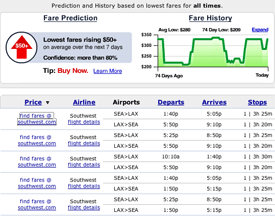 The airfare prediction Farecast launches its public beta today, enabling travelers to leverage more than 60 billion records of past airfare prices to predict whether prices will rise or fall over the next 7 days. The beta covers only flights departing from Seattle and Boston, but the company plans to roll out US-wide coverage through the end of this year.
The airfare prediction Farecast launches its public beta today, enabling travelers to leverage more than 60 billion records of past airfare prices to predict whether prices will rise or fall over the next 7 days. The beta covers only flights departing from Seattle and Boston, but the company plans to roll out US-wide coverage through the end of this year.
The company showed me around the site last week and it looks really useful. The primary upgrade from the private beta is the addition of ajax, making the functionality all the smoother.
The main brain behind Farecast is Oren Etzioni, the head of the University of Washington Computer Science Department’s Turing Center and the founder of search engine MetaCrawler. With $8.5 million in funding from Greylock Partners, Madrona Venture Group and WRF Capital, Farecast development and testing has taken 3 years. The company told me that about 20% of its staff of 22 are data miners or Phd scientists.
 Users select departure and destination along with flight dates, then are shown a graph of past ticket costs, a prediction of the next week’s likely price shifts and a percentage of confidence in the prediction. Tickets are then purchased direct from the airlines, except when multiple vendors are to be used, at which point Farecast works with Orbitz. Advertising contextual to your search will be displayed near the results.
Users select departure and destination along with flight dates, then are shown a graph of past ticket costs, a prediction of the next week’s likely price shifts and a percentage of confidence in the prediction. Tickets are then purchased direct from the airlines, except when multiple vendors are to be used, at which point Farecast works with Orbitz. Advertising contextual to your search will be displayed near the results.
It’s nice to see data mining applied to more than watching you and me, for a change. Presumably this kind of technology could have any number of different applications and systems like this are already used to cut down on industrial inefficiencies I’m sure. Whether a new world of consumer facing data mining applications is responded to favorably by industry or whether they see it as a loss of leverage over consumers seems to be a key question.
Indeed, questions have been raised about whether airlines would approve of such a system; at least some say they like the fact that the purchases are direct from them instead of through a costly third party. Other people have said that the airlines will just change their price patterns if the system proves successful in predicting price dips. Farecast seems determined to have an amiable relationship with airlines and it will be interesting to see if they succeed.
Mike reviewed Farecast when it went into private beta; he complained that SouthWest wasn’t included and always has the best prices. SouthWest doesn’t open their prices to anyone and Farecast does include Southwest schedules in their search results – so it seems they are doing their best. Whether it matters remains to be seen.
I know I tend to buy plane tickets without enough research, so I’ll be checking Farecast and it’s 60 billion plus observations, though of course I’ll check elsewhere as well. If the company’s data is consistently verified by my anecdotal experience then I’ll be back for more. Hopefully Portland will be added to the list soon.